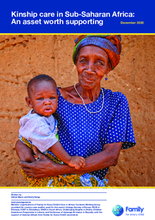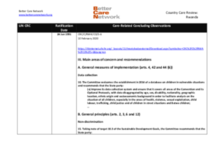This country page features an interactive, icon-based data dashboard providing a national-level overview of the status of children’s care and care reform efforts (a “Country Care Snapshot”), along with a list of resources and organizations in the country.
demographic_data
childrens_living_arrangement
children_living_without_bio
adoption
social_work_force
key_stakeholders
Key Stakeholders
Add New DataOther Relevant Reforms
Add New Datadrivers_of_institutionalisation
Drivers of Institutionaliziation
Add New Datakey_research_and_information
Key Data Sources
Add New DataReport on National Assessment of Centres caring for Children with Disabilities in Rwanda
National Integrated Child Rights Policy
Country Care Review: Rwanda
Prevalence and number of children living in institutional care: global, regional, and country estimates
The Way Forward Project Report
Community-Based Child Protection Mechanisms in Refugee Camps in Rwanda: An Ethnographic Study
Displaying 51 - 60 of 191
This paper argues that kinship care – the care of children by relatives or friends of the family – represents the greatest resource available for meeting the needs of girls and boys who are orphaned or otherwise live apart from their parents.
This webinar heard from three of Family for Every Child's member organisations about their programmes to both integrate and reintegrate children on the move.
The overall objective of the consultancy is to support the inclusion of children with disabilities in the de-institutionalization and family-based care and community support and lead the internal and external coordination efforts.
The Research Program on Children and Adversity at Boston College is seeking Research Associates for the Early Child Development & Violence Prevention Home-Visiting Implementaton Science project inn Rwanda.
UNICEF is seeking a senior and well experienced consultant to facilitate the child protection case management situation analysis, including contextually relevant practical recommendations on the development of a national child protection case management framework and system.
UNICEF is seeking an experienced national consultant to work with and support an international consultant in the facilitation of child protection case management situation analysis, including contextually relevant practical recommendations on the development of a national child protection case management framework and system.
In this first event of Family for Every Child's How We Care series, Family Members CINDI (South Africa), Conacmi (Guatemala) and Uyisenga Ni Imanzi (Rwanda) shared their approaches and experiences of providing psychosocial support to children and families during the COVID-19 crisis.
The main objective of this consultancy is to provide necessary national capacity and hands-on technical support to government social workforce working on the reintegration of children with disabilities from two institutions to family-based care through on-job coaching and mentorship.
The main objective of this consultancy is to provide necessary national capacity and hands-on technical support to government social workforce working on the reintegration of children with disabilities from two institutions to family-based care.
This Country Care Review includes the care-related concluding observations adopted by the Committee on the Rights of the Child and the Committee on the Rights of Persons with Disabilities, as well as other care-related concluding observations, ratification dates, and links to the Universal Periodic Review and Hague Intercountry Adoption Country Profile.


